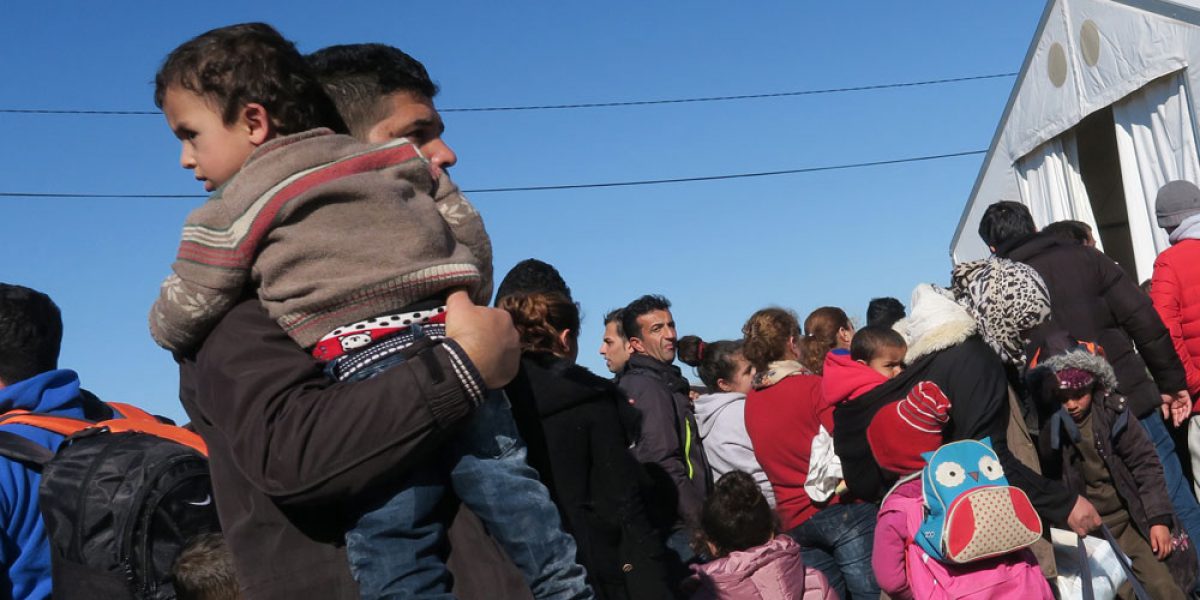Forced migration and the Turkish gate-keeper
08 April 2016

Brussels, 8 April 2016 – As the deportation of migrants from Greece to Turkey resumes today under the EU-Turkey deal we question whether Turkey really can offer the protection that many of these migrants need and whether the European Union is living up to its own core values on human rights.
According to Eurostat, a total of 1.3 million persons have applied for international protection in the 28 European Union member states in 2015. Among them is a Somali girl whom JRS met in Italy.
Yasmin is 19 years old and had to flee her home in Somalia in order to avoid the unwelcome advances of a member of the Al-Shabaab terrorist group. Saying ‘no’ was not an option. She said: “Someone from Al-Shabaab wanted to marry a friend of mine and her father said ‘no’. Both father and daughter were killed.” Fleeing was especially difficult for Yasmin, whose legs had been badly maimed two years earlier, when her home in Mogadishu was caught in crossfire between the army and Al-Shabaab.
The majority of forced migrants who come to Europe are from war-torn countries like Somalia, Iraq or Afghanistan. Others flee from indiscriminate violence and severe human rights violations in countries like Eritrea or Sudan. Or they have been victims of including severe violations of economic, social and cultural rights like the Roma in Serbia.
What is the European Union’s response to their tragedies?
Commission and Member States are making every effort to organize a close cooperation with countries of origin or transit countries. Most prominently it is the Turkish government who is expected to keep away refugees from Europe at all costs. Greece is, for instance, currently considering Turkey as ‘a safe third country’ and attempts to return indiscriminately all migrants including protection-seekers from its borders to Turkey.
At a first glance the Greek authorities have the right to do so. The EU “Dublin Regulation” allows Member States to design lists of “safe third countries” where people in need of protection should apply for asylum. And the European Commission has explicitly invited Member States to put Turkey on such a list. But on a second glance many doubts about the legality of such a measure arise.
The cornerstone of the international refugee protection system is the principle of non-refoulement. This principle prohibits the transfer of anyone in any manner whatsoever to a place where they would be at real risk of serious human rights violations. It has been codified in the 1951 Refugee Convention and numerous international human rights instruments. A breach of this principle can occur in a variety of ways, including directly through forcible returns to the country of origin, or through a transfer to a place where the person risks onwards refoulement.
Can Turkey be considered as ‘safe’ for refugees?
Amnesty International has recently issued an “Urgent Action” in the case of a young Syrian man: M.K. fled Syria in December 2012 and went to Jordan. In November 2015 he decided to go to Turkey, as he thought his orphaned sisters living in Syria may be able to join him there. He was detained on arrival in Istanbul Airport on 9 November 2015. The Turkish authorities attempted to send him back to Jordan the following day, but M.K. said he wished to seek asylum in Turkey. M.K. was then taken to a room at the airport in which he has remained ever since.
M.K. is being detained in a space with no natural light and in which artificial lights are permanently on. He is allegedly denied the medical assistance that he is in need of. Being kept confined in such a space for an extended period of time (in this case since 9 November 2015) may amount to cruel, inhuman or degrading treatment.
Can a state where such severe violations of human rights including the non-refoulement principle really be considered as being ‘safe’ for refugees? Rather not. The European Union and its Member States are in danger of betraying their own core values and norms. There are alternatives to these policies. European leaders need to think about opening up more legal and safe routes for forced migrants. There are concrete proposals on the table; in November 2014, several faith-based organizations issued a joint policy paper on safe and legal paths to protection in Europe. Such measures should be given top priority. Then the European Union would be living up to its own standards and values.
This article was written by JRS Germany policy officer, Stefan Kessler, and was first published in the newsletter of the Commission of the Bishop’s Conferences of the EU and Jesuit European Office. It is available in German here and French here.
Can a state where such severe violations of human rights including the non-refoulement principle really be considered as being ‘safe’ for refugees?
